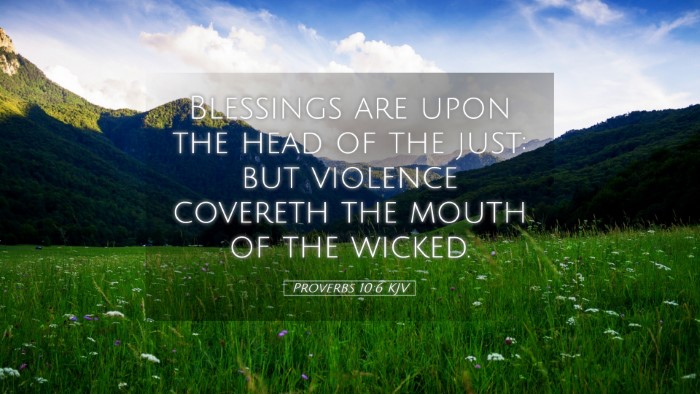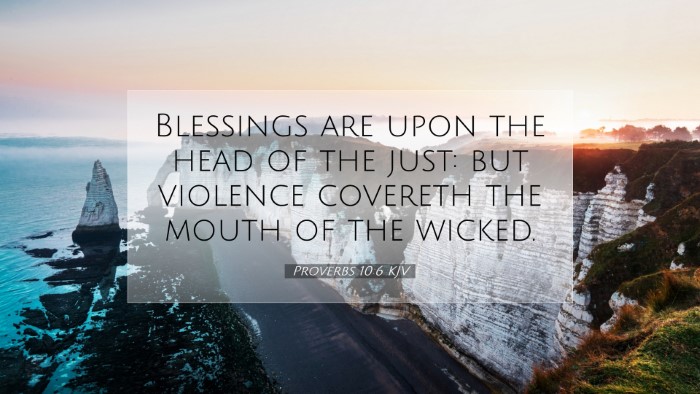Commentary on Proverbs 10:6
Proverbs 10:6 states, "Blessings are upon the head of the just: but violence covereth the mouth of the wicked." This verse encapsulates a profound contrast between the righteous and the wicked, unveiling the timeless consequences of moral actions. Below, we summarize insights from various public domain commentaries to enrich understanding of this verse for pastors, students, theologians, and Bible scholars.
Contextual Introduction
The Book of Proverbs is a compilation of wise sayings and teachings that provide practical guidance for living a life in accordance with God’s intentions. Proverbs 10 marks the beginning of a series of proverbs attributed to Solomon, focusing on the dichotomous paths of the just and the wicked.
Insights from Commentary
Matthew Henry's Commentary
Matthew Henry emphasizes the theme of divine favor bestowed upon the righteous. He interprets the "blessings" mentioned in this verse as both spiritual and material gifts that flow from living a just life. According to Henry, the head symbolizes a place of honor and dignity, suggesting that the just are marked by God’s approval. In contrast, he notes that violence "covering the mouth of the wicked" implies that their deceit and malice conceal their true nature, leading ultimately to their destruction.
Albert Barnes' Commentary
Albert Barnes elaborates on the idea of blessings as indicative of God’s grace in the lives of just individuals. He asserts that the blessings might include peace, prosperity, and a clear conscience. Barnes also discusses the contrasting fate of the wicked, describing how their actions can lead to self-destruction. He notes that the imagery of "violence" as a covering indicates that wickedness may temporarily mask one's true character but will eventually result in shame and ruin.
Adam Clarke's Commentary
Adam Clarke provides a more detailed exploration of the Hebrew terms used in this verse. He points out that “blessings” (בְּרָכָה) implies a state of happiness and prosperity that is a direct result of righteous living. Clarke contrasts this with the "mouth of the wicked," highlighting that the speech of the unjust often leads to chaos and violence, which ultimately reveals their inner corruption. His analysis underscores the moral, ethical, and spiritual implications of the contrasting paths of the just and the wicked.
Thematic Implications
The dual themes of blessing and violence present in Proverbs 10:6 illuminate several important theological and ethical principles worth discussing:
- The Nature of Divine Blessings: The blessings for the just can be viewed as a comprehensive divine favor that permeates all aspects of their lives—spiritual, social, and even economic.
- The Consequences of Wickedness: The violent tendencies of the wicked might serve as a warning about the self-destructive nature of immorality. Their actions lead to not only their own downfall but also harm to those around them.
- Moral Integrity as a Foundation: This verse suggests that moral integrity leads to a fulfilling and blessed life, while immorality brings about chaos and violence.
Practical Applications
For pastors, students, and Bible scholars, this verse provides fertile ground for preaching, teaching, and personal application:
- Preaching on Blessings: Sermons could emphasize the importance of seeking just and righteous living to experience the fullness of God's blessings.
- Encouraging Personal Reflection: Readers should be encouraged to examine their lives in light of this passage, identifying areas where they may not align with biblical justice.
- Moral Accountability: This verse highlights the need for accountability in speech and actions, urging believers to uphold integrity in their communities.
Conclusion
Proverbs 10:6 serves as a poignant reminder of the stark contrast between the lives of the just and the wicked. Through a synthesis of Matthew Henry, Albert Barnes, and Adam Clarke's insights, we see the multifaceted nature of divine blessings and the inevitable outcome of wickedness. The implications of this verse challenge individuals to pursue righteousness not just for personal gain, but as an expression of faith that aligns with God’s character and purposes.


